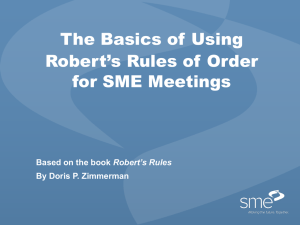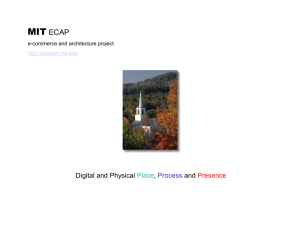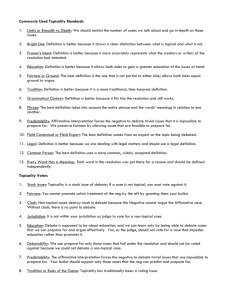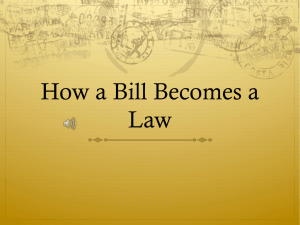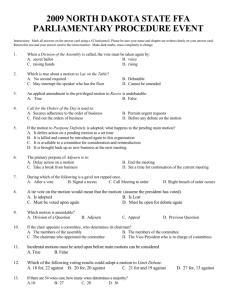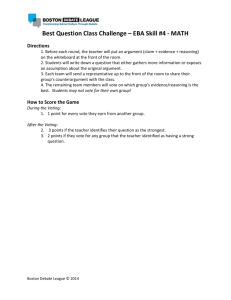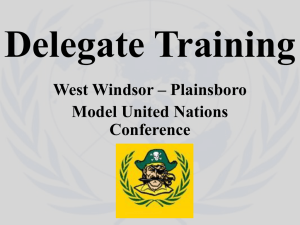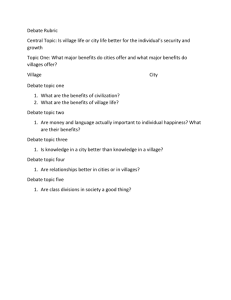talk
advertisement
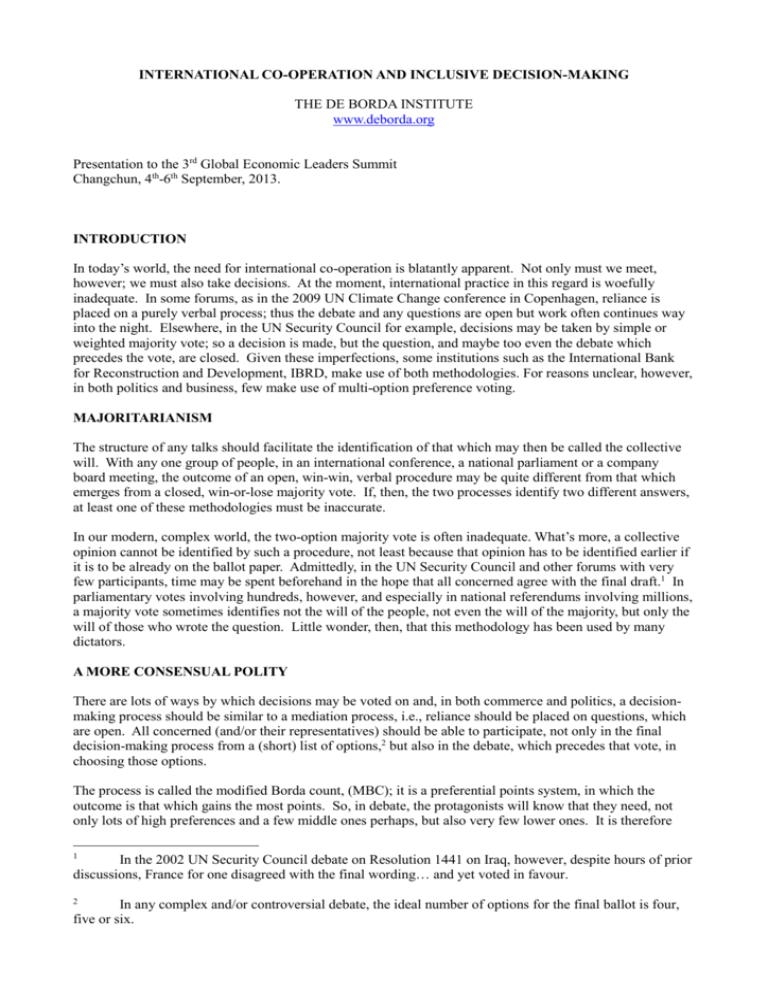
INTERNATIONAL CO-OPERATION AND INCLUSIVE DECISION-MAKING THE DE BORDA INSTITUTE www.deborda.org Presentation to the 3rd Global Economic Leaders Summit Changchun, 4th-6th September, 2013. INTRODUCTION In today’s world, the need for international co-operation is blatantly apparent. Not only must we meet, however; we must also take decisions. At the moment, international practice in this regard is woefully inadequate. In some forums, as in the 2009 UN Climate Change conference in Copenhagen, reliance is placed on a purely verbal process; thus the debate and any questions are open but work often continues way into the night. Elsewhere, in the UN Security Council for example, decisions may be taken by simple or weighted majority vote; so a decision is made, but the question, and maybe too even the debate which precedes the vote, are closed. Given these imperfections, some institutions such as the International Bank for Reconstruction and Development, IBRD, make use of both methodologies. For reasons unclear, however, in both politics and business, few make use of multi-option preference voting. MAJORITARIANISM The structure of any talks should facilitate the identification of that which may then be called the collective will. With any one group of people, in an international conference, a national parliament or a company board meeting, the outcome of an open, win-win, verbal procedure may be quite different from that which emerges from a closed, win-or-lose majority vote. If, then, the two processes identify two different answers, at least one of these methodologies must be inaccurate. In our modern, complex world, the two-option majority vote is often inadequate. What’s more, a collective opinion cannot be identified by such a procedure, not least because that opinion has to be identified earlier if it is to be already on the ballot paper. Admittedly, in the UN Security Council and other forums with very few participants, time may be spent beforehand in the hope that all concerned agree with the final draft.1 In parliamentary votes involving hundreds, however, and especially in national referendums involving millions, a majority vote sometimes identifies not the will of the people, not even the will of the majority, but only the will of those who wrote the question. Little wonder, then, that this methodology has been used by many dictators. A MORE CONSENSUAL POLITY There are lots of ways by which decisions may be voted on and, in both commerce and politics, a decisionmaking process should be similar to a mediation process, i.e., reliance should be placed on questions, which are open. All concerned (and/or their representatives) should be able to participate, not only in the final decision-making process from a (short) list of options,2 but also in the debate, which precedes that vote, in choosing those options. The process is called the modified Borda count, (MBC); it is a preferential points system, in which the outcome is that which gains the most points. So, in debate, the protagonists will know that they need, not only lots of high preferences and a few middle ones perhaps, but also very few lower ones. It is therefore 1 In the 2002 UN Security Council debate on Resolution 1441 on Iraq, however, despite hours of prior discussions, France for one disagreed with the final wording… and yet voted in favour. 2 In any complex and/or controversial debate, the ideal number of options for the final ballot is four, five or six. worth their while to talk with their erstwhile (majoritarian) opponent. Then, in the vote, voters may cast preferences for (one, some or all) the options; and the mathematics of the count encourages the voters to submit a full list. The MBC thus promotes dialogue in debate and mutual respect in the vote. The outcome is bound to show at least one option above the mean. If the winner is way ahead of the rest, it may be termed the collective will; if its consensus coefficient (as it is called) is a little less, then maybe consensus is the better description; if less still, perhaps the outcome should be called the best possible compromise; and if the winning option is only just above the mean, then obviously, other options have similar scores, so there is no consensus and the debate should be resumed. CONCLUSION Majority voting is divisive and often very inaccurate. Furthermore, it gives far too much power to those who set the question. A more inclusive methodology is essential, not only to conclude the successful trade agreement and the comprehensive treaty, but also – and this refers to plebiscites on independence in the Balkans, the Caucasus, Sudan and elsewhere – to reduce the likelihood of ethno-religious wars. Peter Emerson The de Borda Institute www.deborda.org Belfast – 12.8.2013
